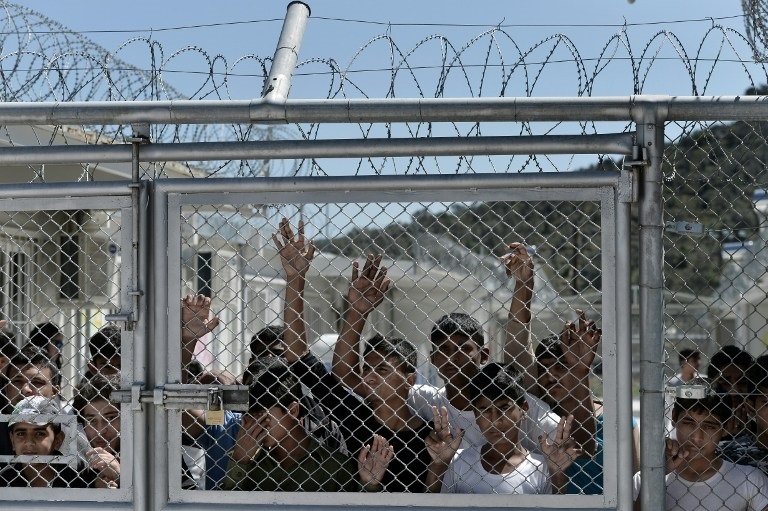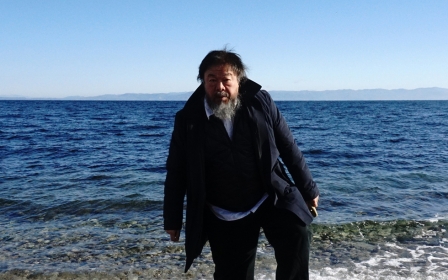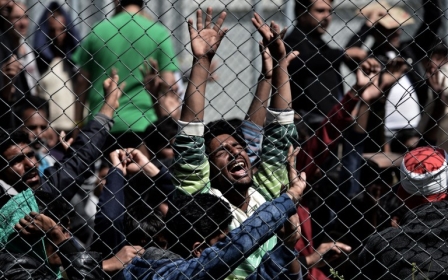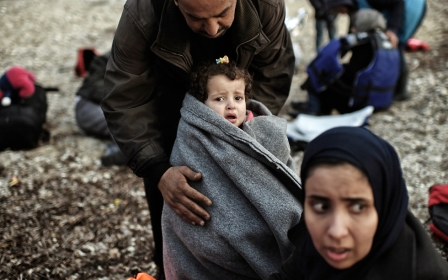Riots rock Lesbos refugee camp as police clash with Syrian youths

ATHENS, Greece – Rioting broke out in a refugee camp on the Greek island of Lesbos on Tuesday, as police temporarily lost control of the site. Black smoke was seen rising from the camp as refugees and migrants burnt bins and built barricades at the main fence.
Fences were torn down and some refugees and migrants fled the Moria camp which has been a closed detention centre since 20 March, when parts of the EU – Turkey deal on migration began to be implemented. Greek police responded by deploying riot control units and firing tear gas.
According to sources inside the camp, violence began at around 4pm local time after a Greek police officer assaulted a teenage Syrian refugee. The teenager was part of a group of Syrian and Afghan minors who approached police and demanded to be released from a closed facility for minors in the camp.
Shamshaid Jutt, a 21-year-old man from Pakistan, described the scene to MEE over the phone: “The minors kept saying to the police ‘give us freedom, give us freedom,’ but the police were saying ‘no’. Then one policeman kicked a Syrian minor, and then older guys [refugees] came and attacked the policeman. Then police came and started using tear gas and then it just increased and increased.”
“The police are outside the gate and they are throwing tear gas at the guys who are protesting. People have broken windows and doors. They have set fire to blankets and bins. Everything is broken,” Jutt added.
Ayesha Keller, a humanitarian volunteer on Lesbos, told MEE by phone that youths are put in a separate closed facility in the camp for their own protection. “The idea is that they are vulnerable and need to be held separately,” she said. “They are meant to be released after just two weeks but the system is back logged so some have been there for over a month.
“I saw a lot of teargas and people bleeding. There were a lot of flying objects: tear gas canisters, stones, chairs, bits of glass.”
The BBC reported that the clashes broke out shortly after the Greek migration minister and a Dutch minister visited the facility originally built as a temporary holding centre.
About 3,000 people are being held in Moria, waiting to hear if they will be allowed to apply for asylum or deported.
“[The minors] want freedom from detention. Because some have been there one month, some two months and they cannot leave,” said Jutt. “They are bored and are constantly requesting to the UNHCR and the police: ‘Please let us out, into the main area [of the camp].'”
According to another man inside the camp who is seeking asylum, many children were badly injured in the violence.
“Three children are next to me getting stitches because their heads are bleeding. Other minors inside have broken arms and legs,” said Gulfam Hassan by phone, a 33-year-old Pakistani.
Tensions at the camp have been increasing in recent weeks due to overcrowding, lack of food and the European Union’s plan to deport all irregular migrants who arrive in Greece back to Turkey.
Jutt said that a fight had broken out earlier on Tuesday while people were in the queue for food.
“There are daily fights in the food line and earlier today [Tuesday] there was a big fight and many people didn’t get any food,” he said.
Boris Cheshirkov, UNHCR spokesperson on Lesbos, confirmed to MEE that there had been an escalation of violence in the camp and that the refugee agency had withdrawn most of their staff from the camp over concern about their safety.
“We have observed tensions over the last few days and today [Tuesday] there was growing tension inside the site with people protesting due to their detention and this one again reinforces the need for alternatives to detention.
“We’ve minimised our presence inside the centre due to security considerations. We understand that the situation is now calmer inside.”
New MEE newsletter: Jerusalem Dispatch
Sign up to get the latest insights and analysis on Israel-Palestine, alongside Turkey Unpacked and other MEE newsletters
Middle East Eye delivers independent and unrivalled coverage and analysis of the Middle East, North Africa and beyond. To learn more about republishing this content and the associated fees, please fill out this form. More about MEE can be found here.




